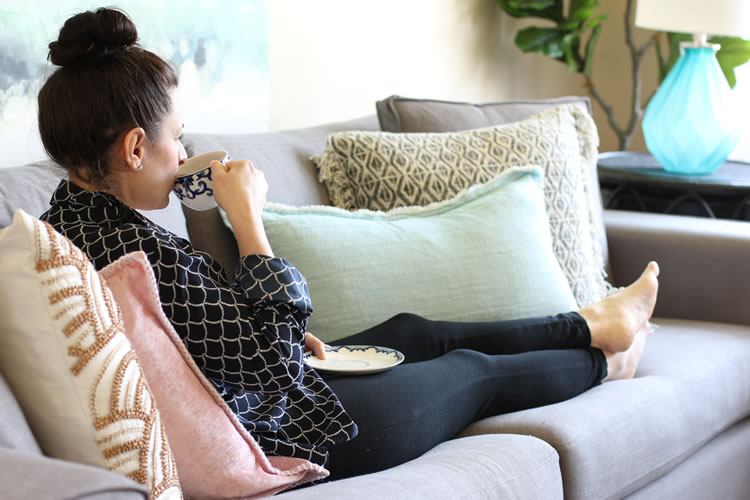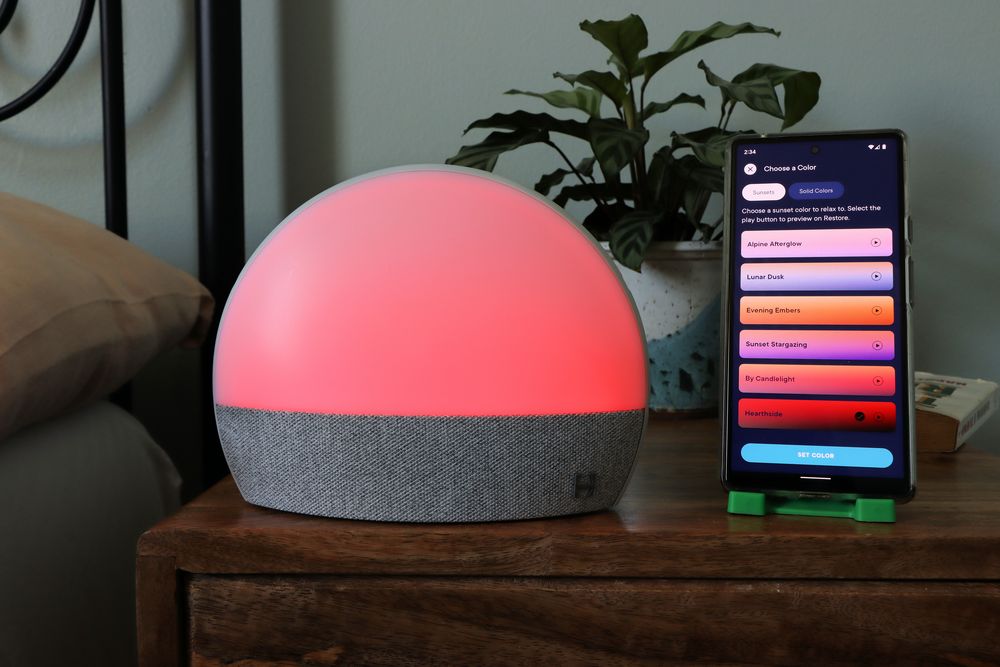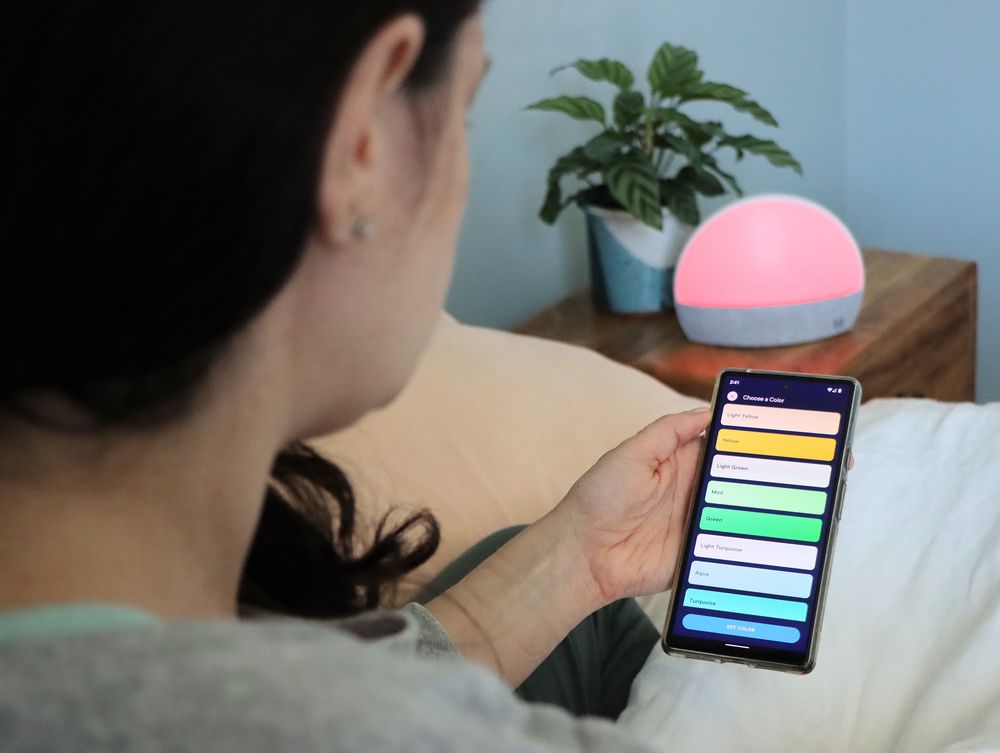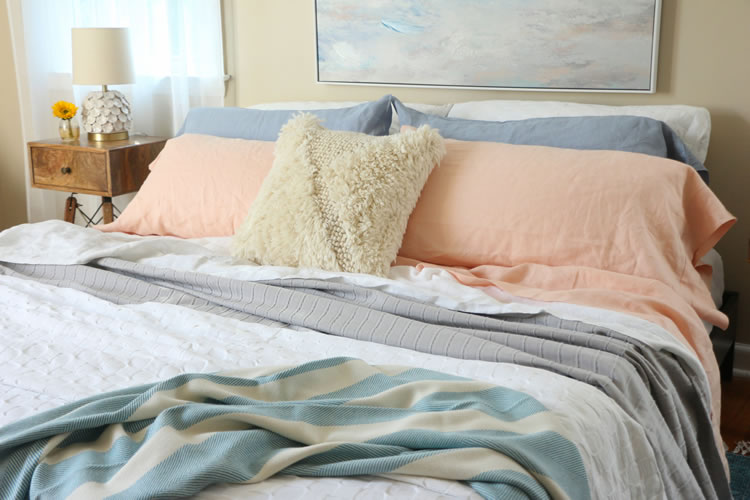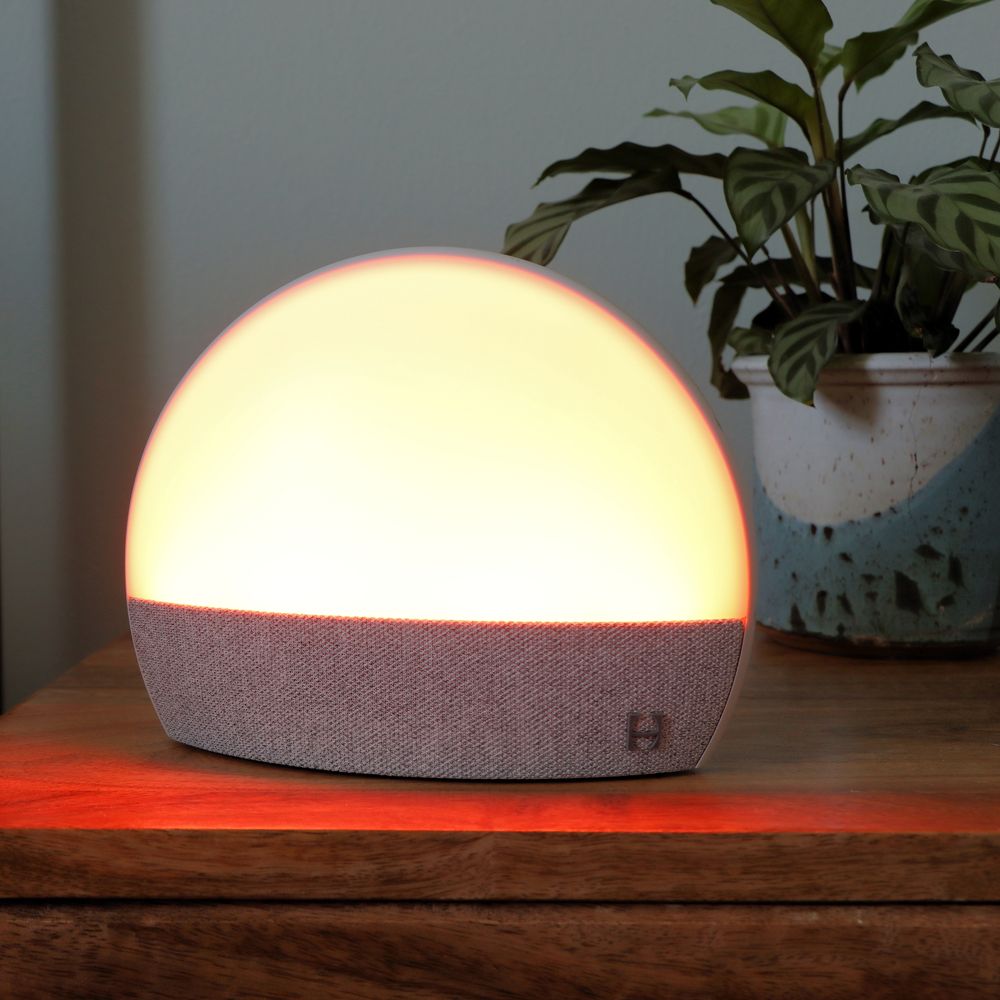Sleep is essential to our physical and mental well-being and most of us don’t get enough quality restful sleep, which can affect almost every aspect of our lives.
A lack of sleep can affect our daily productivity, making us not only stressed, depressed, moody and tired, but it can also cause issues with learning, memory, and concentration [1]. In the long term, a lack of sleep can even lead to more serious health problems, including obesity, lower immunity, high blood pressure, and heart disease [2, 3].
Luckily, if you haven’t been sleeping well lately, there are a few simple things you can do to help you get better sleep.
With some simple lifestyle changes, diet hacks, and the help of a sleep device like the Hatch Restore, here are some tips to get you sleeping better naturally.
1. Don’t Eat Before Bed
We’ve all had late night-cravings. But eating late at night is one of the most common mistakes we make that can sabotage the quality of our sleep.
What makes eating before bed a no-no? It’s not about weight gain.
A recent 2021 study published in the British Journal of Nutrition found that participants who ate or drank 1 hour prior to bedtime were twice as likely to experience “wake after sleep onset” (WASO) than those who did not eat.
Eating a large meal right before bed can put a resource demand on your digestive system and body when it’s supposed to be resting. It can also trigger symptoms like indigestion, heartburn, and acid reflux, which can easily disrupt your sleep.
Research also shows that eating high-carb and sugary foods before bed not only reduces sleep quality but can also make it harder to drift off. [4, 5]
And while we’re more prone to gain weight if we eat before bed, it’s not because our metabolism slows at night. It’s more likely because we make poorer food choices and eat too many extra calories. [6] Studies have also linked poor sleep with increased levels of our hunger hormone ghrelin, which can cause us to want to eat more during the day [7].
Experts recommend eating your last meal a minimum of 2 to 3 hours before bed. If you find you get hungry late at night, you may not be eating enough quality food during the day. Aim to eat more food at breakfast and lunch.
You can also split your evening meal into two servings to make digestion easier on the stomach and help you get to sleep faster.
2. Avoid Drinking Liquids Before Bed
The most obvious reason for not drinking liquids before bed is you’ll be more likely to have to take a few trips to the bathroom during the night. And those interruptions can leave you feeling drowsy the next day.
Similar to the effects of food, sugary beverages like soda, and fruit juices can also delay the onset of sleep. Beverages containing caffeine or alcohol are also especially harmful to a restful night’s sleep.
3. Skip Alcohol to Help You Get to Sleep
Studies have shown that the sedative properties of alcohol can help you fall asleep faster initially. But as the liver metabolizes the alcohol in your blood, it can cause an increase in disruptions later into your sleep cycle.
You can also build a tolerance for the sedative properties of alcohol, which can cause you to need more and more to get the same effect.
Drinking alcohol can also affect sleep negatively by [8]:
- Preventing entry into a deep sleep.
- Decreased overall sleep duration
- Increasing snoring and the sleep disorder sleep apnea, which causes airway muscles to relax and breathing to stop during sleep
In addition, alcohol use can increase anxiety and stress levels over time, which can also negatively affect your sleep. If you’re struggling to get a good night’s sleep, limiting alcohol intake may be a good way to start.
4. Drink Coffee Earlier in the Day
If you’ve ever had a cup of coffee too close to bedtime, there’s a good chance the caffeine had you up all night counting down the minutes until the alarm was going to go off.
Science has shown that consuming caffeine from beverages like coffee, tea, and hot cocoa stimulates the nervous system and can disrupt sleep in several ways. And the older we get, the more susceptible we can become to the effects of caffeine, as our body has a harder time breaking it down.
Caffeine can [9]:
- Delay the onset of sleep
- Interfere with our natural wake-sleep cycle (circadian rhythm)
- Reduce sleep time and quality
- Worsen our perception of sleep
- Decrease the restful stage of sleep that leaves us feeling refreshed and alert in the morning, known as slow-wave sleep [10].
A study published in the Journal of Clinical Sleep Medicine found that even consumed 6 hours before – caffeine, which blocks the sleep-promoting chemical adenosine in the brain could reduce sleep time by up to 1 hour.
So when should you have your last cup of java for the day? There is no perfect time, as it will depend on how sensitive you are to caffeine and your bedtime.
Aim to get your last coffee or caffeine boost around 2 to 3 pm or within 7 to 8 hours before going to bed.
5. Exposure Yourself to Bright Light
It may sound strange, but a growing body of research is finding that exposing yourself to bright light during the day can help you fall asleep at night while improving sleep quality.
Some scientists believe that bright light exposure also helps regulate our natural circadian rhythm (our body’s 24-hour cycle), which tells us when to wake up or wind down for the day.
A study published in The American Journal of Clinical Nutrition found that participants exposed to bright light in the morning ended up sleeping longer and waking up more refreshed.
To get the benefits of bright light for sleep, try to get at least 10-15 minutes of direct light within an hour of waking. The light should be direct (not through glass) and avoid using sunglasses or visors.
In warmer months, try taking an early morning walk.
For darker months and colder climates, we love using the Hatch Restore. This smart alarm clock and “sleep assistant” also has a multi-color built-in lamp with a library of different “sunrises” that will wake you up just like the sun.
6. Limit Blue Light Exposure In The Evening
Blue light is a type of light that’s emitted by screens and other electronic devices.
Many studies have shown that blue light can disrupt sleep [11]. While blue light wavelengths are beneficial during the day, certain types of blue light are especially harmful to the brain and eyes at night.
To reduce your exposure to blue light in the evening, try to avoid using electronics at least an hour before bedtime.
You can also use a night light filter on your smartphone and laptop. They not only can dim the brightness of the screen but also remove blue-toned colors during night-time hours. Newer devices will have this option built into the settings. If yours doesn’t, try downloading an app.
7. Get Plenty Of Exercise
Exercise can improve mood, relieve stress, build muscle and help burn more fat. Exercising during the day can also help improve your overall sleep quality by improving deep sleep [12].
In fact, a study published in The Journal of Sleep Research found that people who exercised for at least 150 minutes per week had improved sleep quality and slept longer than people who didn’t exercise. [13]
Most health experts now recommend adults get at least 150 to 300 minutes of moderate (or 75 to 150 minutes of vigorous) aerobic activity a week.
Add in strength training twice per week for even more benefits.
Here are some tips to help you get started:
- Start with 20-30 minutes per day: Gradually increase the time as you become more conditioned.
- Get 7000 steps per day: Research shows increasing your step count can help you live longer [14].
- Combine cardio exercise + resistance training: They condition different muscles and provide different benefits. Both can help promote better sleep.
Avoid strenuous activities right before bedtime. For some people, this may raise the stress hormone cortisol and make it difficult to fall asleep.
7. Limit Daytime Naps
Many people believe that taking a daytime nap is a great way to improve their sleep. However, experts advise against napping during the day. A nap can actually disrupt the rhythm of your sleep schedule and lead to poor sleep quality.
Instead, try to establish a regular sleep schedule to get the rest you need and limit daytime naps only when you’re truly exhausted or recovering from an illness or injury.
8. Establish A Regular Sleep Schedule
There are many benefits to sticking to a regular sleep schedule, including improved sleep quality and better overall health. Here are a few tips to help you establish a schedule that will get you on track.
- Make a plan. Before bed, take some time to plan or make the next day’s to-do list. This can help get distractions off your mind and prepare you for restorative sleep.
- Establish a regular bedtime. Going to bed at the same time every night promotes restful sleep.
- Keep your room cool. A room temperature between 60 and 68F (or 15-19°C) is ideal for sleep. It helps lower our body temperature so we fall asleep faster.
- Avoid noise and light in the evening. Noise and light can keep you awake at night, so try to avoid watching television or using electronic devices in the evening.
If you stay consistent with a sleep routine, you should feel an improvement in your sleep quality and wake up more refreshed within 10 days to two weeks.
9. Use the Hatch Restore to Make Setting Up a Sleep Routine Easy
Studies show that having a consistent sleep schedule can help you sleep better. If you’ve tried to get a sleep routine going but weren’t successful, try our favorite sleep gadget – the Hatch restore.
A “smart sleep assistant,” Hatch Restore is an all-in-one smart alarm clock that’s also a bedside reading lamp, a soundscape, and a meditation machine designed to make setting up a sleep routine easy.
And if you have trouble winding down at night, it’s an amazing tool that can help you get to sleep faster and stay there using a library of calming sounds, lights, meditations, and bedtime stories.
What’s really cool is that it has a variety of lighting options with sunsets to help you relax at night and sunrises to help you wake naturally.
With the Hatch Restore app, it’s easy to program your own personal timed multi-step sleep routine. 💡 See our full review of Hatch Restore
With the Hatch Restore you can:
- Establish a calming pre-sleep bedtime routine
- Maintain a regular sleep-wake schedule
- Wake up naturally to a selection of sunrises
- Have a sound and meditation machine, dimmable bedside multi-color lamp, and alarm clock all-in-one
Out of the box Hatch Restore has:
- 9 different sleep soundscapes (light rain and river creek)
- 10 different sunrises that gradually brighten like the sun at waking
- 10 different wake sounds (chirping birds, meditative flutes, etc.)
- White and pink noise type sounds to help you block outside noises
- The option to upgrade to their library of premium content
Hatch Restore is a fun device that helps you wind down, and fall asleep fast while improving restful sleep so you wake up more refreshed.
What we love most about it is that it makes waking up something to look forward to instead of a torturous chore.
➡ As a reader of Better Living, get $10 OFF the Hatch Restore!
💡 Or USE promotional code EARLY30 for $30 off the Hatch Restore (valid 11/18 – 11/29)
10. Enjoy A Hot Bath Or Shower Before Bedtime
If you find it difficult to fall asleep, try taking a hot bath or shower before bedtime. This can help relax you and help you drift off easier. Plus, the warm water will soothe your body and mind.
Try adding a few drops of herbal essential oils with sleep-promoting qualities like lavender or valerian [15, 16].
11. Make Your Bedroom Sleep Friendly
To create a relaxing environment that will help you get a better night’s sleep, first, make sure your bedroom is cool, comfortable, and inviting (60 to 68 degrees F is ideal). This will help you get cozy, fall asleep faster, and stay asleep.
Besides using calming paint colors, try using relaxing music, candles, or aromatherapy to help you unwind before bed and create a calming atmosphere.
The Hatch Restore is a great way to enjoy some nightly calming soundscapes and zen lighting to set the mood.
12. Invest in Comfortable Bedding
One of the best ways to improve your sleep is by investing in quality bedding. It doesn’t have to be super expensive. Just make sure it’s cozy and season appropriate, keeping you cool during the summer months and warm in the colder months.
Opt for natural fibers like cotton and wool, which can help regulate your body temperature and wick away moisture.
13. Don’t Watch The Clock
If you’re anything like me, your eyes keep scanning the clock every few minutes to see how much longer you have before you need to get up. This habit can actually be detrimental to your sleep quality because it’s a constant reminder that “time is ticking.”
Instead, try relaxing with some breathing exercises or meditation.
Using a sleep device like the Hatch Restore can also help you relax with soothing sounds, guided meditations and calming lights to help you drift into sleep.
14. Try Sleep Promoting Natural Supplements
A variety of supplements can help improve sleep.
Some of the most popular supplements that have been helpful include:
- magnesium (mineral)
- melatonin (hormone)
- glycine (amino acid)
- L-theanine (amino acid)
Sleep-promoting plant-based and herbal supplements include:
- CBD
- lemon balm
- passion flower
- holy basil (tulsi)
- valerian
- ashwagandha
Only try one of these supplements at a time to find out which one may work best for you.
When choosing a sleep supplement, it is important to consider specific needs. For example, if you struggle with anxiety or insomnia, calming supplements like lemon balm, passionflower, or CBD might be best for you.
However, if you simply want to fall asleep faster and improve your sleep quality overall, holy basil and ashwagandha make good options. Participants in one study reported their sleep improved by an average of 72% after taking ashwagandha for 6 weeks [17].
Ultimately, finding the right supplement for improving your sleep will largely depend on your body. If you’ve tried supplements and still haven’t found one that works for you, consult with a doctor or a sleep specialist.
When to See a Doctor About Your Sleep Problems
If you’ve tried all these tips and you still can’t get to sleep or stay asleep for over two weeks or wake up gasping for air, it may be best to seek the advice of a sleep professional or physician to assess what’s disrupting your ability to get a restful sleep. [18]
Try Hatch Restore to Makeover Your Bedtime Routine For Better, More Restful Sleep
If you think your sleep could use a makeover, you can give Hatch Restore a try risk-free. Hatch also offers:
- Free 2-Day Shipping
- 60-Night Money-Back Guarantee
➡ Order Hatch Restore now to get $10 OFF!
💡 USE CODE EARLY30 for $30 off the Hatch Restore (valid 11/18/22 – 11/29/22)
